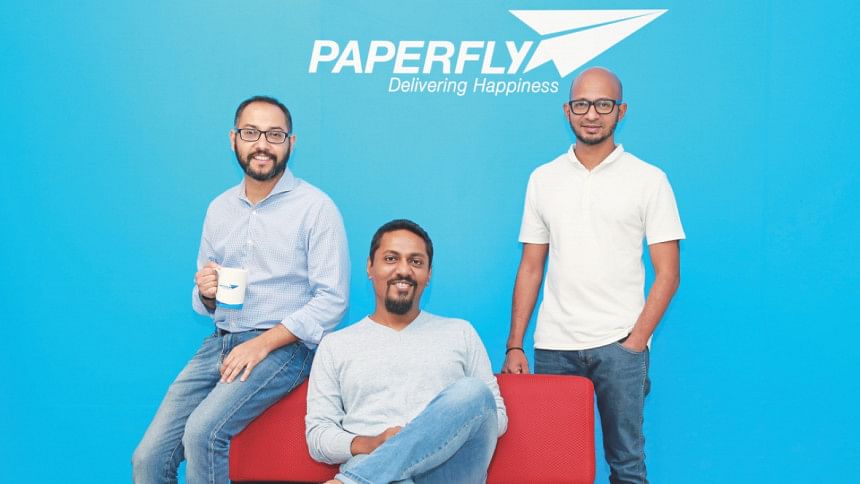PAPERFLY: The story of a ‘to-your-doorstep’ startup

For a couch potato like me, e-commerce is a blessing in disguise. In the last couple of years, the profound boom of e-commerce in Bangladesh has changed everyone's spending pattern, particularly that of the millennials. But have you ever wondered how e-commerce businesses grow steadily by ensuring you are getting all the things that you ordered? Yes, you guessed right. It's the 'logistics' companies that are toiling in the sun and the mud and in traffic to make sure you are getting your 'package' at the comfort of your home at an affordable price.
Paperfly, a startup that claims to be the first true homegrown logistic-tech venture, shares how they were able to scale from a one-room business to a mammoth logis-tech startup that delivers to over 4400 unions.
Paperfly didn't start overnight. The three co-founders of Paperfly have been working in the corporate arena for more than ten years before entering the world of startup. When asked why leave all the luxury and stability that a 9 to 5 job was offering, Shahriar Hassan, CEO of Paperfly chuckled. That demure smile said it all. He said, 'We wanted to do more and start something of our own.' He added, 'We tried several other startup ideas. Some worked but were ahead of their time; some crashed and burned completely. But the startup that can fuel the booming e-bizes of Bangladesh actually stood out.'
Shahriar started to work with this idea and was later joined by two other co-founders: Md. Razibul Islam and A.K Rahath Ahmed. Razibul now heads operations, while Rahath looks after marketing.
When asked how Paperfly's core business concept was developed, Razibul depicted the bigger picture of the e-commerce industry. He answered without a pause, 'After the order has been made in e-commerce or f-commerce platforms, wouldn't it be great if a logistics venture took over the entire responsibility of picking up the product, performing quality check, doing the packaging, and delivering the goods to customers? That's how Paperfly was born.'
Rahath added, 'Surprisingly, as Bangladesh is a CoD dominated market at 99%, logistics here also has to serve as a financial platform to collect the cash from the consumers and transfer the amount to the merchants. And even after closing the sales, if there is a situation where the consumer wants to return it, replace it or get a refund, the logistics has to come to the rescue. Hence our arena of work is much bigger than you might think.'
The co-founders of Paperfly are actually right. They have correctly recognised that no matter how fancy an e-commerce site or how superior its product lines are, it will definitely fail if they can't deliver the goods in the agreed time. And in a country that has more than 70 million potential internet users, the online orders can come from any part of the country. One has to have a solid delivery coverage as a core marketing strength in order to open up the possibilities of serving more consumers.
Paperfly did exactly that!
Paperfly started its journey 2 years ago, after observing the huge growth potential of e-commerce in Bangladesh. Initially they had a small setup only covering Dhaka city. Gradually Paperfly increased its footprint to Chittagong and Sylhet. And now, it covers all 64 districts.
'We currently are the only e-commerce logistics company, which has door-to-door delivery coverage in 64 districts with CoD services. We are managing it all with our own employees and fleet. On average, we deliver packages to more than 40 districts every day. We have reached places like Hatia and even the hill districts. Internet has activated e-commerce in even the farthest corners, and Paperfly is being able to serve them all,' said Rahath. A sense of pride was clearly visible in his eyes.
Paperfly claims to have the widest reach and it's now concentrating on building the strongest door-to-door delivery coverage nationwide, so that it can serve every corner of the country.
When asked how they are adding value to their clients compared to the competition, Razibul said, 'We have expanded our expertise to the fulfillment service and started our own QC and packaging facility. We also aim to get more involved in the backend integration such as warehousing to gain more efficiency for faster delivery. 'Wings' is our homegrown software, which automates our entire logistics system. This one software is used for merchant registration, order management, tracking, invoicing, bank transfers, etc. We are currently working on 'Wings 2.0' which will be more AI based and will address fulfillment requirements more holistically.'
Paperfly is also working closely with A2i to activate more than 4,000 government digital centres as e-commerce hubs so that the rural people can experience online shopping. 'This is a great initiative from A2I to educate the general people on the strength of e-commerce. In the 1st phase, Paperfly will be delivering the online orders in over 400 digital centers across Bangladesh,' said Shahriar.
When asked what the future looks like, Shahriar said with a cozy smile, 'To be as big as Amazon in terms of delivery in Bangladesh.'
Indeed, that's ambitious.

 For all latest news, follow The Daily Star's Google News channel.
For all latest news, follow The Daily Star's Google News channel. 



Comments